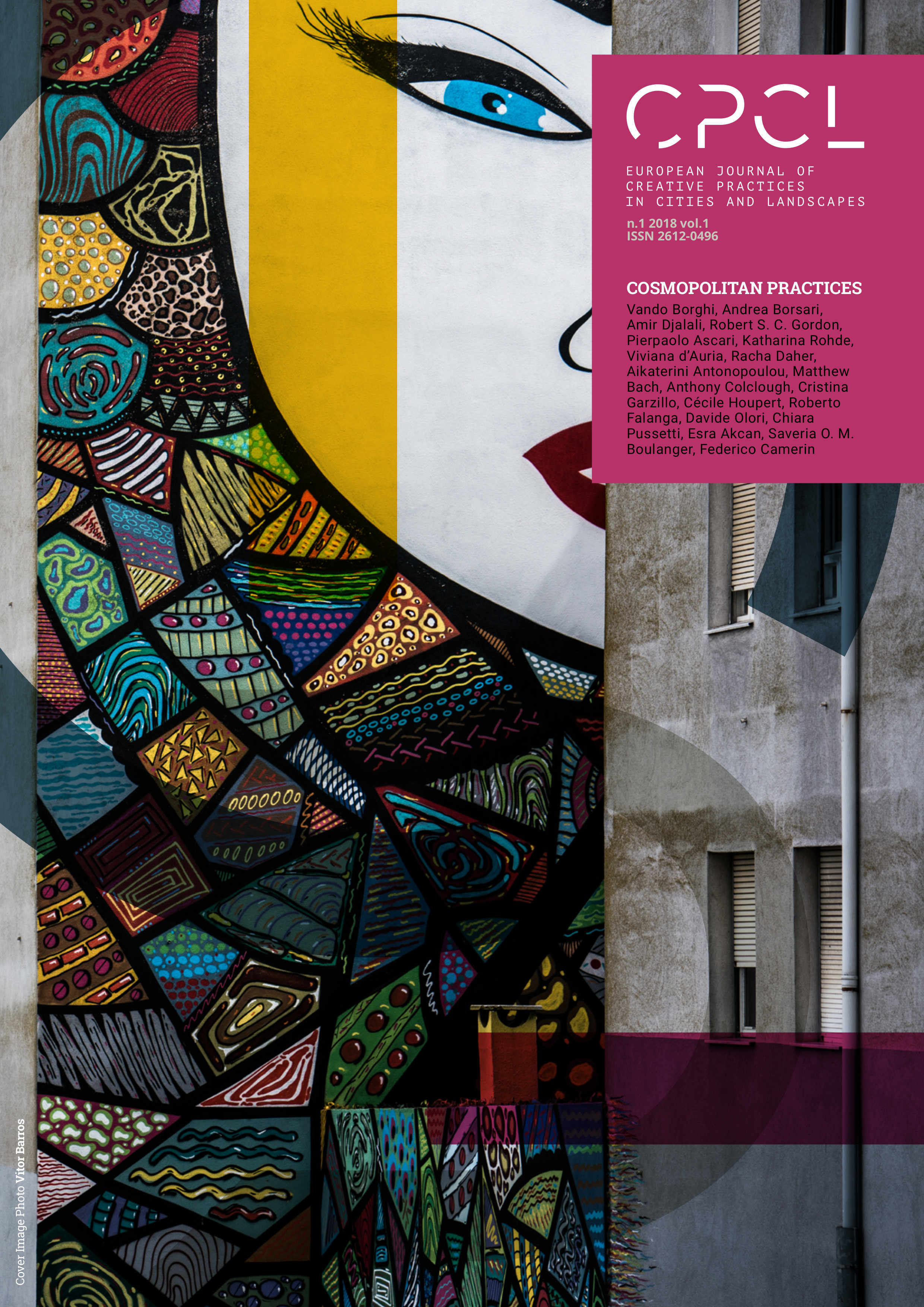Bodies, Spaces and Citizenship: the Theoretical Contribution of Frantz Fanon
DOI:
https://doi.org/10.6092/issn.2612-0496/8686Keywords:
Frantz Fanon, camp, phenomenology, Gillo PontecorvoAbstract
The theoretical horizon of the post-colonial city postulates the survival of the old imperial projects in the structuring or production of the current European and North American space. The genealogy of this space fully incorporates Frantz Fanon's considerations of the situated form of membership produced by the colonial city.References
Agamben, Giorgio. Homo sacer: Sovereign Power and Bare Life, trans. by Daniel Heller-Roazen Stanford, CA: Meridian, 1998.
Agier, Michel, ed. The Jungle: Calais’s Camps and Migrants Hoboken, NJ: Wiley, 2018.
Arendt, Hannah. On Violence. New York and London: Harvest/HBJ, 1970.
Beneduce, Roberto. “La potenza del falso. Mimesi e alienazione in Frantz Fanon.” aut aut 354 (2012): 25-29.
Bentouhami, Hourya. “De Gramsci à Fanon, un marxisme decentré.” Actuel Marx 55 (2014): 99-118. DOI: 10.3917/amx.055.0099.
Bhabha, Homi. “Remembering Fanon: Self Psyche and the Colonial Condition.” Introduction to Frantz Fanon, Black Skins, White Masks, xxi-xxxvi. London: Pluto Press, 2008.
Bignardi, Irene. Memorie estorte a uno smemorato. Vita di Gillo Pontecorvo. Milan: Feltrinelli, 1999.
Butler, Judith. “Violence, Non-violence: Sartre on Fanon.” Graduate Faculty Philosophy Journal 27, no. 1 (2006): 3-24. DOI: 10.5840/gfpj200627122.
Chandoke, Neera. “The post-colonial city.” Economic and Political Weekly 26, no. 50 (1991): 2868-2873.
Clare, Stephanie. “Geopower. The Politics of Life and Land in Frantz Fanon’s Writing.” Diacritics 41, no. 4 (2013): 60-80.
Clemente, Pietro. Frantz Fanon tra esistenzialismo e rivoluzione. Rome-Bari: Laterza, 1971.
Di Cesare, Donatella. Stranieri residenti. Una filosofia della migrazione. Turin: Bollati Boringhieri, 2017.
Didi-Huberman, Georges and Niki Giannari. Passer, quoi qu’il en coûte. Paris: Les Éditions de Minuit, 2017.
Di Sante, Costantino. Stranieri indesiderabili. Verona: Ombre Corte, 2011.
Fanon, Frantz. The Wretched of the Earth, translated by Constance Farrington. New York: Grove Press, 1963.
———. “Algeria Unveiled,” in A Dying Colonialism, trans. by Haakon Chevalier, 35-68. New York: Grove Press, 1965.
———. “Racism and Culture.” In Towards the African Revolution, trans. by Haakon Chevalier, 29-44. (New York: Grove Press, 1988).
Frankl, Viktor E. Man’s Search for Meaning. New York: Washington Square Press, 1985.
Kotek, Joël, and Pierre Rigoulot. Le siècle des camps. Détention, concentration, extermination, cent ans de mal radical. Paris: CJ Lattès, 2000.
Luxembourg, Rosa. The Accumulation of Capital, trans. by Agnes Schwrzschild. New Haven, Yale University Press, 1951.
Mahendram, Dylan, “The Facticity of Blackness. A Non-Conceptual Approach to the Study of Race and Racism in Fanon’s and Merleau-Ponty’s Phenomenology.” Human Architecture: Journal of the Sociology of Self-Knowledge 5, no. 3 (2007): 191-203.
Mbembe, Achille. “La pharmacie de Fanon.” In Politiques de l’inimitié. Paris: La Découverte, 2016.
———. Critique of the Black Reason. Durham, NC: Duke University Press, 2017.
Mezzadra, Sandro. “Questione di sguardi. Du Bois e Fanon.” In Fanon postcoloniale. I dannati della terra* oggi*, edited by Miguel Mellino. Verona: Ombre Corte, 2013.
Kipfer, Stefan. “Fanon and Space: Colonization, Urbanization, and Liberation from the Colonial to the Global City”, Environment and Planning D: Society and Space 25, no. 4 (2007): 701-726. DOI: 10.1068/dkipfer.
Moore, Lindsay. "The Veil of Nationalism: Frantz Fanon’s ‘Algeria Unveiled’ and Gillo Pontecorvo’s The Battle of Algiers." Kunapipi 25, no. 2 (2003): 56-73.
Jacobson, David and Jamie Goodwin-White. “The Future of Postnational Citizenship: Human Rights and Borders in a Re-Nationalizing World.” Mondi Migranti 2 (2018): 7-26.
Pieprzak, Katarzyna. “Zones of Perceptual Enclosure: The Aesthetics of Immobility in Casablanca's Literary Bidonvilles.” Research in African Literatures 47, no. 3 (Fall 2016): 32-49. DOI: 10.2979/reseafrilite.47.3.03.
Rawick, George P. The American Slave: From Sundown to Sunup. Westport, Conn.: Greenwood Pub. Co., 1972.
Sekyi-Otu, Ato. “Fanon and the Possibility of Postcolonial Critical Imagination”, in Living Fanon: Global Perspectives, edited by Nigel Gibson, 45-60. London: Palgrave Mcmillan, 2011.
Sigona. Nando. “Campzenship: reimagining the camp as a social and political space.” Citizenship Studies 19, no. 1 (2015). DOI: 10.1080/13621025.2014.937643
Weate, Jeremy. “Fanon, Merleau-Ponty and the Difference of Phenomenology.” In Race, edited by Robert Bernasconi, 169-183. Oxford: Blackwell, 2001.
Yeoh, Brenda S. A. “Postcolonial cities”, Progress in Human Geography 25, no. 3 (2001): 456-468. DOI: 10.1191/030913201680191781.
Published
How to Cite
Issue
Section
License
Copyright (c) 2018 Pierpaolo Ascari
Copyrights and publishing rights of all the texts on this journal belong to the respective authors without restrictions.This journal is licensed under a Creative Commons Attribution 4.0 International License (full legal code).
See also our Open Access Policy.





